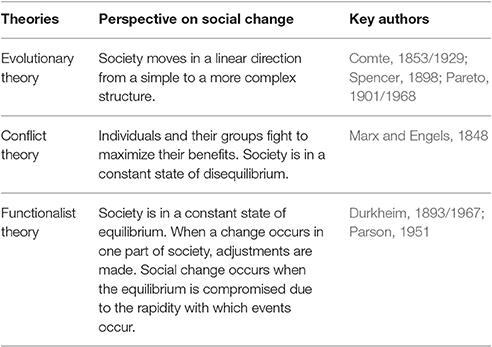
Relevance: Sociology: Paper I: Social Change
Classical- Evolutionary Theory of Change
Evolutionary theories are based on the assumption that societies gradually change from simple to more complex forms. Early sociologists beginning with Auguste Comte believed that human societies evolve in a unilinear way– that is in one line of development. According to them social change meant progress toward something better. They saw change as FUNCTIONAL and beneficial. To them the evolutionary process implied that societies would necessarily reach new and higher levels of civilization. These evolutionary view of social change was highly influenced by Charles Darwin’s theory of Organic Evolution.

- H Morgan believed that there were three basic stages in the process of evolutionary change:
- Savagery,
- Barbarism and
- Civilization.
- Auguste Comte’s ideas relating to the three stages in the development of human thought and also of society namely-the theological, the metaphysical and the positive in a way represent the three basic stages of social change.
- Herbert Spencer:
- Spencer started with the assumption that reality was governed by the cosmic law of evolution. He said; “the evolution is an integration of matter and concomitant dissipation of matter during which matter passes from the indefinite incoherent homogeneity to definite coherent heterogeneity”. Stated in simple words, this means that evolution is a twin process of “differentiation and integration” whereby a simple and less differentiated society is formed.
- Spencer’s conception of the notion of social reality was influenced by biology. Adopting organismic analogy, Spencer believes that like individual organism, societies were made up of inter-connected and interdependent parts. In case of society these parts are social institutions. A more or less persisting network of inter-dependent parts constitutes the social structure.
Like organism, societies are also characterized by progressive increase in size. Increase in size is followed by increase in differentiation and integration. Thus, simple societies had relatively undifferentiated social structure. Increasing differentiation or in other words increasing division of labour is accompanied by new means of maintaining integration. Thus, societies either due to change in environment or due to internal growth of population gradually undergo evolutionary change. This change is viewed as progressive and unidirectional process involving transition from small and simple to large and complex type of societies. Spencer’s theory of change is a macro theory because the entire societies are taken as a unit of analysis.
Further, Spencer even examined certain stages which the societies in course of their evolution passed. Each stage is characterized by increasing differentiation and increase in the integration. The evolutionary sequence consists of the following stages:
- Simple society (Herd or band)
- Compound society (Tribe and chiefdom)
- Doubly compounded society (City state & kingdom)
- Trebly compounded society (Empire and modern nation state)
- T. Hobhouse:
- Following Spencer, L.T. Hobhouse also presented the sequence of evolution. Like Spencer, he continued to believe in the idea of progress. However, he used concept of social development to analyse and explain social change.
- Taking advancement in human knowledge as the chief indicator of development, Hobhouse also presented an evolutionary sequence tracing development of human society through five stages:
- Stage of preliterate societies
- Stage of literacy and proto-science
- Stage of reflective thought
- Stage of critical thought in Greece
- State of modern science.

